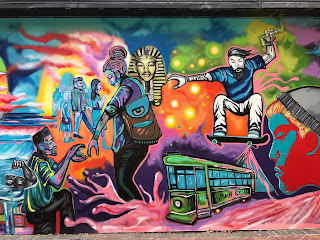Memphis, Tennessee
August 30 to September 4, 2018
Tuesday September 4, 2018 - this morning I'm meeting with Wendi C. Thomas, a highly accomplished journalist and educator who created and leads the MLK50: Justice Through Journalism project (you can also find information about her project here).
After reading a few of her articles, and seeing the descriptive terms Journalist, Dreamer, Disruptor on her twitter account, I emailed her to see if she would chat with me about her work. I'll put the highlights of our conversation in a separate post. For now, I'd like to share a few thoughts and pictures about why Memphis is one of the more important stops on my sabbatical journey.
Memphis is home to the Lorraine Motel, a site used by many people, including celebrities and activists, during segregation. People like Aretha Franklin, Ray Charles and Louis Armstrong all stayed here after Walter and Loree Bailey bought the place in 1945 and converted it from a whites only motel to one that could be found and used by black patrons.
On a local note, I recommend learning about Harriet and Harry T. Moore AND reading Gilbert King's book The Devil in the Grove to find out more about Central Florida's history of segregation.
The assassination of Dr. Martin Luther King, Jr. on April 4, 1968 at 6:01 pm forever changed the city of Memphis, our nation and arguably, the world. The building is now home to the National Civil Rights Museum, a place dedicated to telling the story of not only Dr. Martin Luther King, Jr.'s last days, but also the larger history of our country's brutal struggle with slavery and segregation. I bought a year membership and visited the museum a few times during my stay. There is so much to learn.
After reading a few of her articles, and seeing the descriptive terms Journalist, Dreamer, Disruptor on her twitter account, I emailed her to see if she would chat with me about her work. I'll put the highlights of our conversation in a separate post. For now, I'd like to share a few thoughts and pictures about why Memphis is one of the more important stops on my sabbatical journey.
Memphis is home to the Lorraine Motel, a site used by many people, including celebrities and activists, during segregation. People like Aretha Franklin, Ray Charles and Louis Armstrong all stayed here after Walter and Loree Bailey bought the place in 1945 and converted it from a whites only motel to one that could be found and used by black patrons.
On a local note, I recommend learning about Harriet and Harry T. Moore AND reading Gilbert King's book The Devil in the Grove to find out more about Central Florida's history of segregation.
The assassination of Dr. Martin Luther King, Jr. on April 4, 1968 at 6:01 pm forever changed the city of Memphis, our nation and arguably, the world. The building is now home to the National Civil Rights Museum, a place dedicated to telling the story of not only Dr. Martin Luther King, Jr.'s last days, but also the larger history of our country's brutal struggle with slavery and segregation. I bought a year membership and visited the museum a few times during my stay. There is so much to learn.
Church of God in Christ Mason Temple - where Dr. King gave his last speech on April 3, 1968
Consider this for a moment - Exactly a year before his death, King gave a speech called Beyond Vietnam in New York City at the Riverside Church. This speech brought even more criticism upon King because of his statement that the U.S. was "the greatest purveyor of violence in the world today." In many ways, King may have been even more criticized and hated over the last year of his life than any other time. Two works that cover this incredibly meaningful time are HBO's documentary King in the Wilderness and Tavis Smiley's book Death of a King: The Real Story of Dr. Martin Luther King Jr.'s Final Year. As Smiley points out, King said there was a triple threat eroding our country - racism, militarism and poverty. King obviously had been struggling against racism and poverty but with this quote he was also confronting what Eisenhower had warned the country about just a few years earlier - the military industrial complex.
Clayborn Temple and the I Am A Man Plaza
More Memphis murals












No comments:
Post a Comment